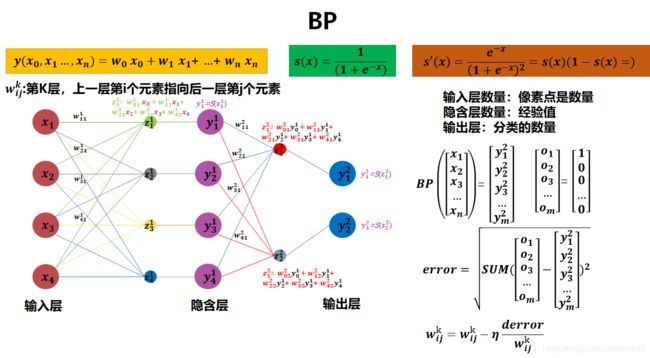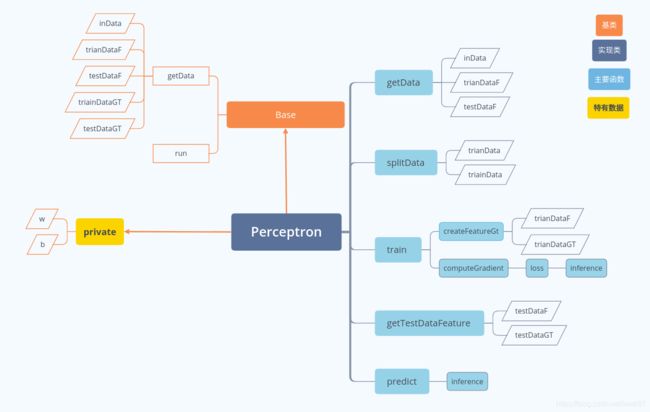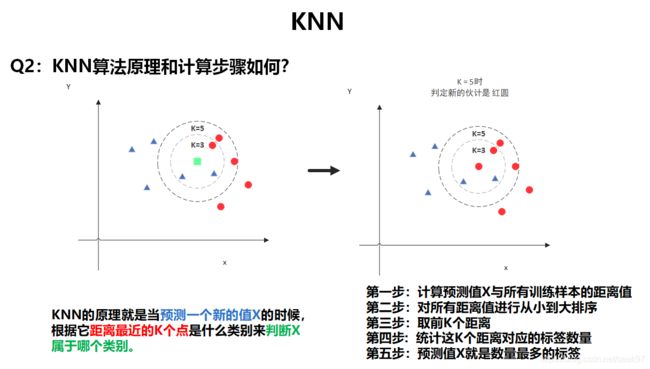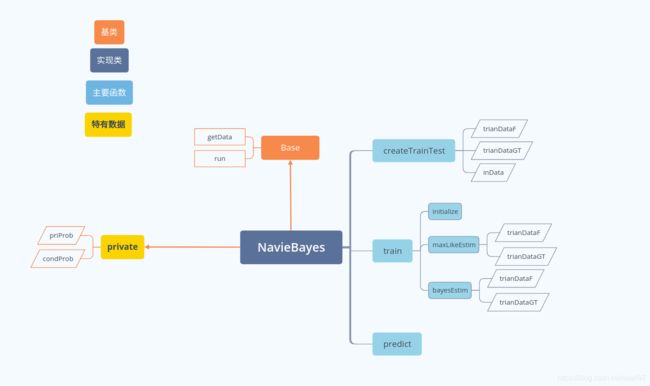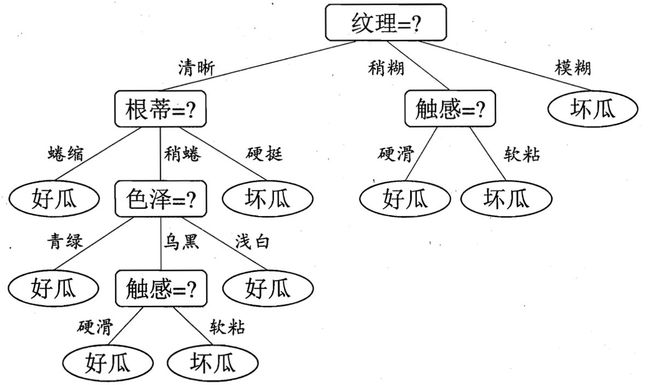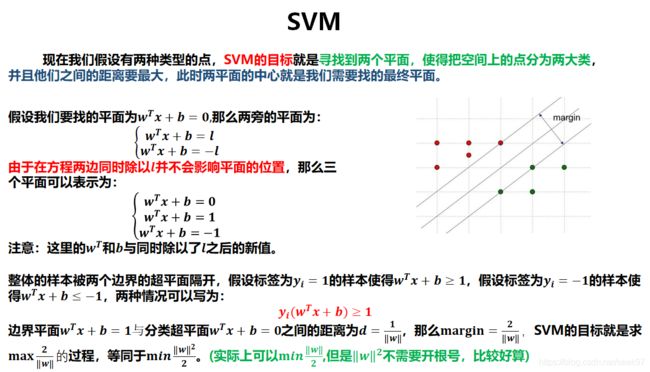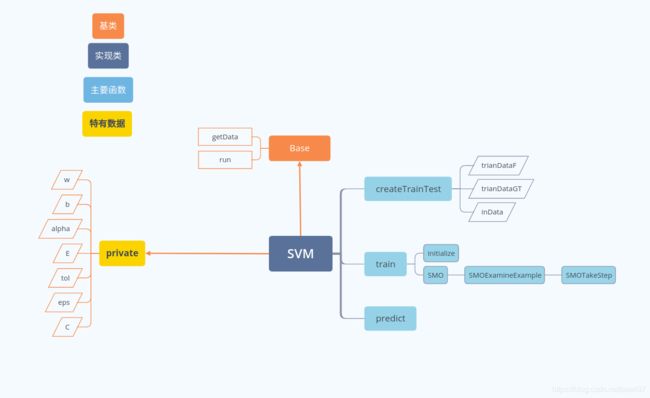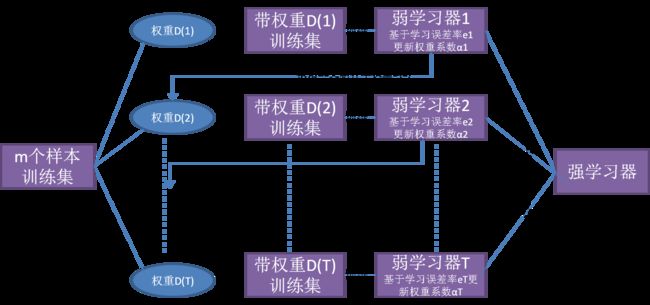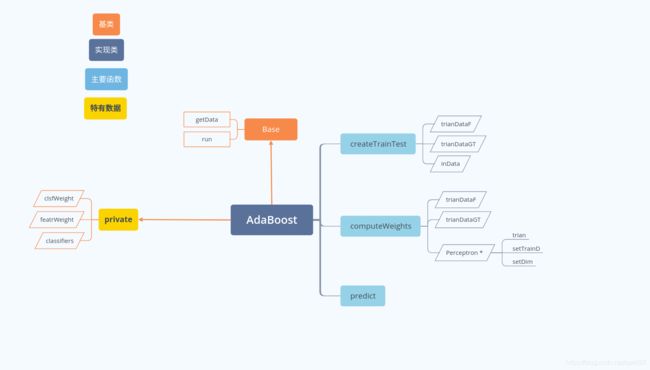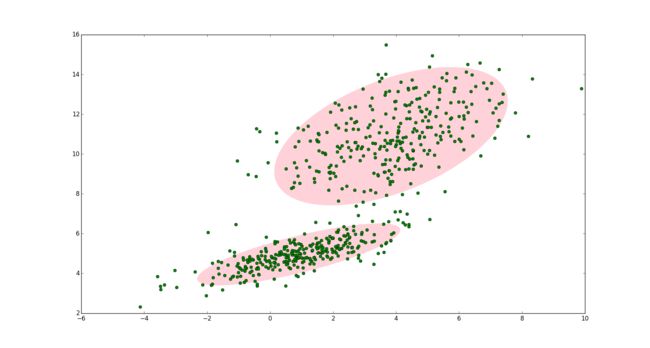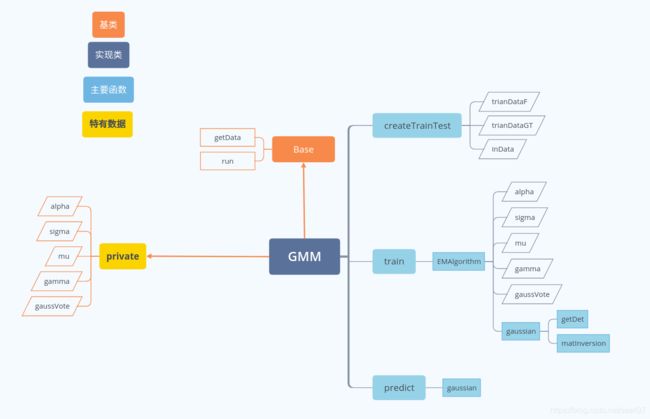机器学习算法C++实现
目录
感知机
main.cpp
perceptron.cpp
perceptron.h
model_base.h
K近邻
main.cpp
knn.cpp
knn.h
朴素贝叶斯
main.cpp
决策树
main.h
decisiontree.cpp
DecisionTree.h
逻辑回归
main.h
logistic.cpp
Logistic.h
支持向量机
main.cpp
svm.cpp
SVM.h
adaBoost
main.h
AdaBoost.cpp
AdaBoost.h
GMM
main.h
GMM.cpp
GMM.h
感知机
https://www.cnblogs.com/liuhuacai/p/11973036.html
main.cpp
#include
#include
#include "perceptron.h"
using std::vector;
using std::cout;
using std::endl;
int main() {
Base* obj = new Perceptron();
obj->run();
delete obj;
return 0;
}
perceptron.cpp
#include "perceptron.h"
using std::string;
using std::vector;
using std::pair;
void Perceptron::getData(const std::string &filename) {
//load data to a vector
std::vector temData;
double onepoint;
std::string line;
inData.clear();
std::ifstream infile(filename);
std::cout<<"reading ..."<> onepoint){
temData.push_back(onepoint);
}
indim = temData.size();
indim -= 1;
inData.push_back(temData);
}
std::cout<<"total data is "< trainf;
trainf.assign(data.begin(), data.end()-1);
trainDataF.push_back(trainf);
trainDataGT.push_back(*(data.end()-1));
}
for (const auto& data:testData){
std::vector testf;
testf.assign(data.begin(), data.end()-1);
testDataF.push_back(testf);
testDataGT.push_back(*(data.end()-1));
}
}
void Perceptron::initialize(std::vector& init) {
// must initialize parameter first, using vector to initialize
if(init.size()!=indim+1) {
std::cout<<"input dimension is should be "+std::to_string(indim+1)<& inputData){
//just compute wx+b , for compute loss and predict.
if (inputData.size()!=indim){
std::cout<<"input dimension is incorrect. "<& inputData, const double& groundTruth){
double infer = inference(inputData);
double loss = -1.0 * groundTruth * infer;
std::cout<<"loss is "<< loss <, double> Perceptron::computeGradient(const std::vector& inputData, const double& groundTruth) {
double lossVal = loss(inputData, groundTruth);
std::vector wi;
double bi;
if (lossVal >= 0.0)
{
for(auto indata:inputData) {
wi.push_back(indata*groundTruth);
}
bi = groundTruth;
}
else{
for(auto indata:inputData) {
wi.push_back(0.0);
}
bi = 0.0;
}
return std::pair, double>(wi, bi);//here, for understandable, we use pair to represent w and b.
//you also could return a vector which contains w and b.
}
void Perceptron::train(const int & step, const float & lr) {
std::vector init = {1.0,1.0,1.0};
initialize(init);
int count = 0;
for(int i=0; i inputData = trainDataF[count];
double groundTruth = trainDataGT[count];
auto grad = computeGradient(inputData, groundTruth);
auto grad_w = grad.first;
double grad_b = grad.second;
for (int j=0; j& inputData) {
double out = inference(inputData);
if(out>=0.0){
return 1;
}
else{
return -1;
}
}
/*perceptrondata.txt
3 4 1
1 1 -1
2 4 1
1 2 -1
1 5 1
2 0.5 -1
1 6 1
1 2.5 -1
0.5 6 1
0 1 -1
2 2.5 1
0.5 1 -1
1 4 1
1.5 1 -1
2.7 1 1
2 3.5 1
0.8 3 -1
0.1 4 -1
*/
void Perceptron::run(){
//记得更改样本路径
getData("../data/perceptrondata.txt");
splitData(0.6);//below is split data , and store it in trainData, testData
createFeatureGt();
train(200, 1.0);//20 is steps and 1.0 is learning rate
std::vector> testData = getTestDataFeature();
std::vector testGT = getTestGT();
for(int i=0; i perceptron.h
#ifndef MACHINE_LEARNING_PERCEPTRON_H
#define MACHINE_LEARNING_PERCEPTRON_H
#include
#include
#include
#include "model_base.h"
class Perceptron: public Base{
private:
std::vector w;
double b;
public:
virtual void getData(const std::string& filename);
virtual void run();
void splitData(const float& );
void createFeatureGt();//create feature for test,using trainData, testData
void setDim(const unsigned long& iDim){indim = iDim;}
double inference(const std::vector&) ;
void initialize(std::vector& init);
void train(const int& step,const float& lr);
int predict(const std::vector& inputData);
double loss(const std::vector& inputData, const double& groundTruth);
std::pair, double> computeGradient(const std::vector& inputData, const double& groundTruth);
std::vector> getTestDataFeature(){return testDataF;}
std::vector getTestGT(){ return testDataGT;}
};
#endif //MACHINE_LEARNING_PERCEPTRON_H
model_base.h
#ifndef MACHINE_LEARNING_MODEL_BASE_H
#define MACHINE_LEARNING_MODEL_BASE_H
#include
#include
#include
#include
#include
#include
using std::vector;
using std::cout;
using std::endl;
//this base class is for run
class Base{
protected:
std::vector trainDataGT;//真值
std::vector testDataGT;
std::vector> inData;//从文件都的数据
std::vector> trainData;//分割后的训练数据,里面包含真值
std::vector> testData;
unsigned long indim = 0;
std::vector> trainDataF;//真正的训练数据,特征
std::vector> testDataF;
public:
void setTrainD(vector>& trainF, vector& trainGT) {trainDataF = trainF; trainDataGT=trainGT;}
void setTestD(vector>& testF, vector& testGT) {testDataGT = testGT; testDataGT=testGT;}
virtual void getData(const std::string& filename)=0;
virtual void run()=0;
virtual ~Base(){};
template
friend auto operator + (const vector& v1, const vector& v2)->vector;
template
friend auto operator - (const vector& v1, const vector& v2)->vector;
template
friend double operator * (const vector& v1, const vector& v2);
template
friend auto operator / (const vector& v1, const vector& v2)->vector;
template
friend auto operator + (const T1& arg1, const vector& v2)->vector;
template
friend auto operator - (const T1& arg1, const vector& v2)->vector;
template
friend auto operator * (const T1& arg1, const vector& v2)->vector;
template
friend auto operator / (const T1& arg1, const vector& v2)->vector;
template
friend auto operator + (const vector& v1, const T2& arg2)->vector;
template
friend auto operator - (const vector& v1, const T2& arg2)->vector;
template
friend auto operator * (const vector& v1, const T2& arg2)->vector;
template
friend auto operator / (const vector& v1, const T2& arg2)->vector;
template
friend vector> transpose(const vector>& mat);
template
friend vector> vecMulVecToMat(const vector& vec1, const vector& vec2);
template
friend auto operator + (const vector>& v1, const vector>& v2)
->vector>;
};
template
auto operator + (const vector& v1, const vector& v2) ->vector {
if (v1.size() != v2.size()) {
cout << "two vector must have same size." << endl;
throw v1.size() != v2.size();
}
if (v1.empty()) {
cout << "vector must not empty." << endl;
throw v1.empty();
}
vector re(v1.size());
for (int i = 0; i < v1.size(); ++i) {
re[i] = v1[i] + v2[i];
}
return re;
}
template
auto operator - (const vector& v1, const vector& v2)->vector {
if (v1.size() != v2.size()) {
cout << "two vector must have same size." << endl;
throw v1.size() != v2.size();
}
if (v1.empty()){
cout << "vector must not empty." << endl;
throw v1.empty();
}
vector re(v1.size());
for (int i = 0; i < v1.size(); ++i) {
re[i] = v1[i] - v2[i];
}
return re;
}
template
double operator * (const vector& v1, const vector& v2) {
if (v1.size() != v2.size()) {
cout << "two vector must have same size." << endl;
throw v1.size() != v2.size();
}
if (v1.empty()){
cout << "vector must not empty." << endl;
throw v1.empty();
}
decltype(v1[0] * v2[0]) re = 0;
for (int i = 0; i < v1.size(); ++i) {
re += v1[i] * v2[i];
}
return re;
}
template
auto operator / (const vector& v1, const vector& v2)->vector {
if (v1.size() != v2.size()) {
cout << "two vector must have same size." << endl;
throw v1.size() != v2.size();
}
if (v1.empty()){
cout << "vector must not empty." << endl;
throw v1.empty();
}
vector re(v1.size());
for (int i = 0; i < v1.size(); ++i) {
re[i] = v1[i] / v2[i];
}
return re;
}
template
auto operator + (const T1& arg1, const vector& v2)->vector{
if (v2.empty()){
cout << "vector must not empty." << endl;
throw v2.empty();
}
vector re(v2.size());
for (int i = 0; i < v2.size(); ++i) {
re[i] = arg1 + v2[i];
}
return re;
}
template
auto operator - (const T1& arg1, const vector& v2)->vector{
if (v2.empty()){
cout << "vector must not empty." << endl;
throw v2.empty();
}
vector re(v2.size());
for (int i = 0; i < v2.size(); ++i) {
re[i] = arg1 - v2[i];
}
return re;
}
template
auto operator * (const T1& arg1, const vector& v2)->vector{
if (v2.empty()){
cout << "vector must not empty." << endl;
throw v2.empty();
}
vector re(v2.size());
for (int i = 0; i < v2.size(); ++i) {
re[i] = arg1 * v2[i];
}
return re;
}
template
auto operator / (const T1& arg1, const vector& v2)->vector{
if (v2.empty()){
cout << "vector must not empty." << endl;
throw v2.empty();
}
vector re(v2.size());
for (int i = 0; i < v2.size(); ++i) {
re[i] = arg1 / v2[i];
}
return re;
}
template
auto operator + (const vector& v1, const T2& arg2)->vector{
return arg2+v1;
}
template
auto operator - (const vector& v1, const T2& arg2)->vector{
return arg2-v1;
}
template
auto operator * (const vector& v1, const T2& arg2)->vector{
return arg2*v1;
}
template
auto operator / (const vector& v1, const T2& arg2)->vector{
if (v1.empty()){
cout << "vector must not empty." << endl;
throw v1.empty();
}
vector re(v1.size());
for (int i = 0; i < v1.size(); ++i) {
re[i] = v1[i]/arg2;
}
return re;
}
template
vector> transpose(const vector>& mat) {
vector> newMat (mat.size(), vector (mat.size(), 0));
for (int i = 0; i < mat.size(); ++i) {
for (int j = 0; j < mat.size(); ++j)
newMat[i][j] = mat[j][i];
}
return newMat;
}
template
vector> vecMulVecToMat(const vector& vec1, const vector& vec2) {
if (vec1.size() != vec2.size())
cout << "Two dimension of two vectors are not same!" << endl;
vector> newMat (vec1.size(), vector (vec2.size(), 0));
for (int i = 0; i < vec1.size(); ++i) {
for (int j = 0; j < vec2.size(); ++j){
newMat[i][j] = vec1[i] * vec2[j];
}
}
return newMat;
}
template
auto operator + (const vector>& v1, const vector>& v2)
->vector> {
if (v1.size() != v2.size())
std::cerr<< "Two dimension of two vectors are not same!" << endl;
vector> newMat;
for (int i = 0; i < v1.size(); ++i)
newMat.push_back(v1[i] + v2[i]);
return newMat;
}
#endif //MACHINE_LEARNING_MODEL_BASE_H
K近邻
main.cpp
#include
#include
#include "knn.h"
using std::vector;
using std::cout;
using std::endl;
int main() {
Base* obj = new Knn();
obj->run();
delete obj;
return 0;
}
knn.cpp
#include "knn.h"
using std::string;
using std::vector;
using std::pair;
using std::priority_queue;
using std::stack;
void Knn::getData(const std::string &filename) {
//load data to a vector
std::vector temData;
double onepoint;
std::string line;
inData.clear();
std::ifstream infile(filename);
std::cout<<"reading ..."<> onepoint){
temData.push_back(onepoint);
}
indim = temData.size();
indim -= 1;
inData.push_back(temData);
}
std::cout<<"total data is "<> varianceVec;
auto sumv = trainData[0];
for(unsigned long i=1;i subMean;
for(const auto& c:trainData)
subMean.push_back(c-meanv);
for (unsigned long i = 0; i < trainData.size(); ++i) {
for (unsigned long j = 0; j < indim; ++j) {
subMean[i][j] *= subMean[i][j];
}
}
auto varc = subMean[0];
for(unsigned long i=1;i(i, var[i]));
}
std::sort(varianceVec.begin(), varianceVec.end(), [](pair &left, pair &right) {
return left.second < right.second;
});
for(const auto& variance:varianceVec){
axisVec.push(variance.first);//the maximum variance is on the top
}
cout<<"createSplitAxis over"< &left, vector &right) {
return left[axis]leftTreeVal.push_back(trainData[i]);
else
root->rightTreeVal.push_back(trainData[i]);
} else{
root->val.assign(trainData[i].begin(),trainData[i].end()-1);
root->splitVal = trainData[i][axis];
root->axis = axis;
root->cls = *(trainData[i].end()-1);
}
}
cout<<"root node set over"<>& data, stack& axisStack) {
stack aS;
if(axisStack.empty())
aS=axisVec;
else
aS=axisStack;
auto node = new KdtreeNode();
node->parent = root;
auto axis2 = aS.top();
aS.pop();
std::sort(data.begin(), data.end(), [&axis2](vector &left, vector &right) {
return left[axis2]leftTreeVal.empty()&&node->rightTreeVal.empty()){
for(unsigned long i = 0; i < data.size(); ++i){
if(i!=mid){
if (ileftTreeVal.push_back(data[i]);
else
node->rightTreeVal.push_back(data[i]);
} else{
node->val.assign(data[i].begin(),data[i].end()-1);
node->splitVal = data[i][axis2];
node->axis = axis2;
node->cls = *(data[i].end()-1);
}
}
}
if(!node->leftTreeVal.empty()){
node->left = buildTree(node, node->leftTreeVal, aS);
}
if(!node->rightTreeVal.empty()){
node->right = buildTree(node, node->rightTreeVal, aS);
}
return node;
}
void Knn::showTree(KdtreeNode* root) {
if(root == nullptr)
return;
cout<<"the feature is ";
for(const auto& c:root->val)
cout<cls<left);
showTree(root->right);
}
void Knn::findKNearest(vector& testD){
cout<<"the test data is(the last is class) ";
for(const auto& c:testD)
cout< path;
auto curNode = root;
while(curNode!= nullptr){
path.push(curNode);
if(testD[curNode->axis]<=curNode->splitVal)
curNode = curNode->left;
else
curNode = curNode->right;
}
while(!path.empty()){
auto curN = path.top();
path.pop();
vector testDF(testD.begin(),testD.end()-1);
double dis=0.0;
dis = computeDis(testDF, curN->val);
if(maxHeap.size()(dis, curN));
}
else{
if(dis(dis, curN));
}
}
if(path.empty())
continue;
auto curNparent = path.top();
KdtreeNode* curNchild;
if(testDF[curNparent->axis]<=curNparent->splitVal)
curNchild = curNparent->right;
else
curNchild = curNparent->left;
if(curNchild == nullptr)
continue;
double childDis = computeDis(testDF, curNchild->val);
if(childDis(childDis, curNchild));
while(curNchild!= nullptr){//add subtree to path
path.push(curNchild);
if(testD[curNchild->axis]<=curNchild->splitVal)
curNchild = curNchild->left;
else
curNchild = curNchild->right;
}
}
}
}
double Knn::computeDis(const vector& v1, const vector& v2){
auto v = v1 - v2;
double di = v*v;
return di;
}
void Knn::DeleteRoot(KdtreeNode *pRoot) //<根据根节点删除整棵树
{
if (pRoot == nullptr) {
return;
}
KdtreeNode *pLeft = pRoot->left;
KdtreeNode *pRight = pRoot->right;
delete pRoot;
pRoot = nullptr;
if (pLeft) {
DeleteRoot(pLeft);
}
if (pRight) {
DeleteRoot(pRight);
}
return;
}
Knn::~Knn(){
DeleteRoot(root);
}
/*perceptrondata.txt
3 4 1
1 1 -1
2 4 1
1 2 -1
1 5 1
2 0.5 -1
1 6 1
1 2.5 -1
0.5 6 1
0 1 -1
2 2.5 1
0.5 1 -1
1 4 1
1.5 1 -1
2.7 1 1
2 3.5 1
0.8 3 -1
0.1 4 -1
*/
void Knn::run(){
getData("../data/perceptrondata.txt");
createTrainTest(0.6);
createSplitAxis();
setRoot();
root->left = buildTree(root, root->leftTreeVal, axisVec);
root->right = buildTree(root, root->rightTreeVal, axisVec);
cout<<"show the tree in preorder traversal."<val)
cout << c << " ";
cout << endl;
maxHeap.pop();
}
}
}
knn.h
#ifndef MACHINE_LEARNING_KNN_H
#define MACHINE_LEARNING_KNN_H
#include
#include
#include
#include
#include "model_base.h"
struct KdtreeNode {
std::vector val;//store val for feature
int cls;//store class
unsigned long axis;//split axis
double splitVal;//mid val for axis
std::vector> leftTreeVal;
std::vector> rightTreeVal;
KdtreeNode* parent;
KdtreeNode* left;
KdtreeNode* right;
KdtreeNode(): cls(0), axis(0), splitVal(0.0), parent(nullptr), left(nullptr), right(nullptr){};
};
class Knn: public Base{
private:
std::stack axisVec;
KdtreeNode* root = new KdtreeNode();
unsigned long K;
std::priority_queue> maxHeap;
public:
virtual void getData(const std::string& filename);
virtual void run();
void createTrainTest(const float& trainTotalRatio);
KdtreeNode* buildTree(KdtreeNode*root, std::vector>& data, std::stack& axisstack);
void setRoot();
void createSplitAxis();
KdtreeNode* getRoot(){return root;}
void setK(unsigned long k){K = k;}
void findKNearest(std::vector& testD);
double computeDis(const std::vector& v1, const std::vector& v2);
void DeleteRoot(KdtreeNode *pRoot);
void showTree(KdtreeNode* root);
~Knn();
};
#endif //MACHINE_LEARNING_KNN_H
朴素贝叶斯
main.cpp
#include
#include
#include "NavieBayes.h"
using std::vector;
using std::cout;
using std::endl;
int main() {
Base* obj = new NavieBayes();
obj->run();
delete obj;
return 0;
}
naviebayes.cpp
#include "NavieBayes.h"
using std::string;
using std::vector;
using std::pair;
using std::map;
using std::set;
void NavieBayes::getData(const std::string &filename) {
//load data to a vector
std::vector temData;
double onepoint;
std::string line;
inData.clear();
std::ifstream infile(filename);
std::cout<<"reading ..."<> onepoint){
temData.push_back(onepoint);
}
indim = temData.size();
indim -= 1;
inData.push_back(temData);
}
std::cout<<"total data is "< trainf;
trainf.assign(data.begin(), data.end()-1);
trainDataF.push_back(trainf);
trainDataGT.push_back(*(data.end()-1));
}
for (const auto& data:testData){
std::vector testf;
testf.assign(data.begin(), data.end()-1);
testDataF.push_back(testf);
testDataGT.push_back(*(data.end()-1));
}
}
void NavieBayes::maxLikeEstim(){
for(const auto& gt: trainDataGT){
priProb[std::to_string(gt)] += 1;
}
for(unsigned long i=0;i, double> m;
for(const auto& xval : xVal[i])
for(const auto& yval:yVal){
auto cond = std::make_pair(std::to_string(xval), std::to_string(yval));
m[cond]=0;
}
condProb.push_back(m);
}
for(const auto& val:yVal)
priProb[std::to_string(val)]=0;
}
void NavieBayes::train(const string& estim="mle"){
//train actually is create priProb and condProb.
if(xVal.empty() && yVal.empty()){
cout<<"please set range of x and y first."<pre){
pre = pr;
y_t = y;
}
}
cout<<"the test data predict class is "<> x {{1,2,3},{4,5,6}};//书中例题第二维的取值是字母,为了方便换成了4,5,6
vector y {-1,1};
setInVal(x);
setOutVal(y);
train("byse");
vector testDF {2, 4};
testDataF.push_back(testDF);
testDataGT.push_back(-1);
predict();
}
NavieBayes.h
#ifndef MACHINE_LEARNING_NAVIEBAYES_H
#define MACHINE_LEARNING_NAVIEBAYES_H
#include
#include
#include
#include 决策树
main.h
#include
#include
#include "DecisionTree.h"
using std::vector;
using std::cout;
using std::endl;
int main() {
Base* obj = new DecisionTree();
obj->run();
delete obj;
return 0;
}
decisiontree.cpp
#include "DecisionTree.h"
using std::string;
using std::vector;
using std::pair;
using std::map;
using std::priority_queue;
using std::set;
void DecisionTree::getData(const string &filename) {
// load data to a vector
std::vector temData;
double onepoint;
std::string line;
inData.clear();
std::ifstream infile(filename);
std::cout << "reading ..." << std::endl;
while (!infile.eof()) {
temData.clear();
std::getline(infile, line);
if (line.empty())
continue;
std::stringstream stringin(line);
while (stringin >> onepoint) {
temData.push_back(onepoint);
}
indim = temData.size();
indim -= 1;
inData.push_back(temData);
}
for (int i = 0; i < indim; ++i)
features.push_back(i); // initialize features
std::cout << "total data is " << inData.size() < trainf;
trainf.assign(data.begin(), data.end()-1);
trainDataF.push_back(trainf);
trainDataGT.push_back(*(data.end()-1));
}
for (const auto& data:testData){
std::vector testf;
testf.assign(data.begin(), data.end()-1);
testDataF.push_back(testf);
testDataGT.push_back(*(data.end()-1));
}
}
void DecisionTree::initializeRoot(){
root = new DtreeNode();
}
DtreeNode* DecisionTree::buildTree(DtreeNode* node, vector>& valRange) {
if (!node)
return nullptr;
if (features.empty())
return nullptr;
pair splitFeatureAndValue = createSplitFeature(valRange);
node->axis = splitFeatureAndValue.first;
node->splitVal = splitFeatureAndValue.second;
set cls_left;
set cls_right;
for (const auto& data : valRange){
if (data[node->axis] == node->splitVal) {
node->leftTreeVal.push_back(data);
cls_left.insert(data.back());
}
else {
node->rightTreeVal.push_back(data);
cls_right.insert(data.back());
}
}
if (cls_left.size()<=1){ //belong to the same class
node->left = new DtreeNode();
node->left->isLeaf = true;
node->left->leafValue = node->leftTreeVal;
}
else if (!node->leftTreeVal.empty()) {
node->left = new DtreeNode();
node->left = buildTree(node->left, node->leftTreeVal);
} else{
return nullptr;
}
if (cls_right.size()<=1){ //belong to the same class
node->right = new DtreeNode();
node->right->isLeaf = true;
node->right->leafValue = node->rightTreeVal;
}
else if (!node->rightTreeVal.empty()){
node->right = new DtreeNode();
node->right = buildTree(node->right, node->rightTreeVal);
} else{
return nullptr;
}
if (!node->right&&!node->left){
node->isLeaf=true;
node->leafValue = valRange;
}
return node;
}
pair DecisionTree::createSplitFeature(vector>& valRange){
priority_queue>, vector>>, std::greater>>> minheap;
//pair> first value is Gini value, second pair (pair) first value is split
//axis, second value is split value
vector> dataDivByFeature(indim); //vector size is num of axis, map's key is the value of feature, map's value is
//num belong to feature'value
vector> featureVal(indim); //store value for each axis
vector, int>> datDivByFC(indim); //vector size is num of axis, map's key is the feature value and class value, map's value is
//num belong to that feature value and class
set cls; //store num of class
for(const auto& featureId:features) {
if (featureId<0)
continue;
map dataDivByF;
map, int> dtDivFC;
set fVal;
for (auto& data:valRange){ //below data[featureId] is the value of one feature axis, data.back() is class value
cls.insert(data.back());
fVal.insert(data[featureId]);
if (dataDivByF.count(data[featureId]))
dataDivByF[data[featureId]] += 1;
else
dataDivByF[data[featureId]] = 0;
if (dtDivFC.count(std::make_pair(data[featureId], data.back())))
dtDivFC[std::make_pair(data[featureId], data.back())] += 1;
else
dtDivFC[std::make_pair(data[featureId], data.back())] = 0;
}
featureVal[featureId] = fVal;
dataDivByFeature[featureId] = dataDivByF;
datDivByFC[featureId] = dtDivFC;
}
for (auto& featureId: features) { // for each feature axis
if (featureId<0)
continue;
for (auto& feVal: featureVal[featureId]){ //for each feature value
double gini1 = 0 ;
double gini2 = 0 ;
double prob1 = dataDivByFeature[featureId][feVal]/double(valRange.size());
double prob2 = 1 - prob1;
for (auto& c : cls){ //for each class
double pro1 = double(datDivByFC[featureId][std::make_pair(feVal, c)])/dataDivByFeature[featureId][feVal];
gini1 += pro1*(1-pro1);
int numC = 0;
for (auto& feVal2: featureVal[featureId])
numC += datDivByFC[featureId][std::make_pair(feVal2, c)];
double pro2 = double(numC-datDivByFC[featureId][std::make_pair(feVal, c)])/(valRange.size()-dataDivByFeature[featureId][feVal]);
gini2 += pro2*(1-pro2);
}
double gini = prob1*gini1+prob2*gini2;
minheap.push(std::make_pair(gini, std::make_pair(featureId, feVal)));
}
}
features[minheap.top().second.first]=-1;
return minheap.top().second;
}
void DecisionTree::showTree(DtreeNode* node) {
if(node == nullptr)
return;
cout<<"the leaf class is "<< bool(node->isLeaf) <axis<splitVal<isLeaf){
for (auto& data : node->leafValue){
cout<<"leaf value are(the last value is class): ";
for (auto& d:data)
cout<left);
showTree(node->right);
}
/*decisiontree.txt
1 2 2 3 2
1 2 2 2 2
1 1 2 2 1
1 1 1 3 1
1 2 2 3 2
2 2 2 3 2
2 2 2 2 2
2 1 1 2 1
2 2 1 1 1
2 2 1 1 1
3 2 1 1 1
3 2 1 2 1
3 1 2 2 1
3 1 2 3 1
3 2 2 2 2
*/
void DecisionTree::run() {
//记得更改样本地址
getData("../data/decisiontree.txt");
createTrainTest();
initializeRoot();
buildTree(root, trainData);
showTree(root);
}
DecisionTree.h
#ifndef MACHINE_LEARNING_DECISIONTREE_H
#define MACHINE_LEARNING_DECISIONTREE_H
#include
#include
#include
#include 逻辑回归
https://github.com/tobeprozy/MachineLearning_Python
 main.h
main.h
#include
#include
#include "Logistic.h"
using std::vector;
using std::cout;
using std::endl;
int main() {
Base* obj = new Logistic();
obj->run();
delete obj;
return 0;
}
logistic.cpp
#include "Logistic.h"
using std::string;
using std::vector;
using std::pair;
void Logistic::getData(const string &filename){
//load data to a vector
std::vector temData;
double onepoint;
std::string line;
inData.clear();
std::ifstream infile(filename);
std::cout<<"reading ..."<> onepoint){
temData.push_back(onepoint);
}
indim = temData.size();
inData.push_back(temData);
}
std::cout<<"total data is "< trainf;
trainf.assign(data.begin(), data.end()-1);
trainf.push_back(1.0);
trainDataF.push_back(trainf);
trainDataGT.push_back(*(data.end()-1));
}
for (const auto& data:testData){
std::vector testf;
testf.assign(data.begin(), data.end()-1);
testf.push_back(1.0);
testDataF.push_back(testf);
testDataGT.push_back(*(data.end()-1));
}
}
double Logistic::logistic(const vector& data){
double expval = exp(w * data);
return expval/(1.0+expval);
}
void Logistic::initialize(const vector& wInit){
w = wInit;
}
vector Logistic::computeGradient(const vector& trainFeature, double trainGrT){
return -1*trainFeature*(trainGrT-logistic(trainFeature));
}
void Logistic::train(const int& step, const double& lr) {
int count = 0;
for(int i=0; i grad = computeGradient(trainDataF[count], trainDataGT[count]);
double fl;
if (trainDataGT[count]==0)
fl = 1;
else
fl = -1;
w = w + fl*lr*grad;
auto val = trainDataF[count]*w;
double loss = -1*trainDataGT[count]*val + log(1 + exp(val));
cout<<"step "<& inputData, const double& GT){
cout<<"The right class is "<=0.5){
std::cout<<"The predict class is 1"< init (indim, 0.5);
initialize(init);
train(20, 1.0);//20 is steps and 1.0 is learning rate
for(int i=0; i Logistic.h
#ifndef MACHINE_LEARNING_LOGISTIC_H
#define MACHINE_LEARNING_LOGISTIC_H
#include
#include
#include "model_base.h"
class Logistic: public Base{
private:
vector w;
public:
virtual void getData(const std::string &filename);
virtual void run();
double logistic(const std::vector& data);
void createTrainTest();
void initialize(const std::vector& );
void train(const int& step, const double& lr);
std::vector computeGradient(const std::vector& trainFeature, double trainGrT);
double predict(const std::vector& inputData, const double& GT);
};
#endif //MACHINE_LEARNING_LOGISTIC_H
支持向量机
main.cpp
#include
#include
#include "SVM.h"
using std::vector;
using std::cout;
using std::endl;
int main() {
Base* obj = new SVM();
obj->run();
delete obj;
return 0;
}
svm.cpp
#include "SVM.h"
using std::string;
using std::vector;
using std::pair;
void SVM::getData(const string &filename){
//load data to a vector
std::vector temData;
double onepoint;
std::string line;
inData.clear();
std::ifstream infile(filename);
std::cout<<"reading ..."<> onepoint){
temData.push_back(onepoint);
}
indim = temData.size()-1;
inData.push_back(temData);
}
std::cout<<"total data is "< trainf;
trainf.assign(data.begin(), data.end()-1);
trainDataF.push_back(trainf);
trainDataGT.push_back(*(data.end()-1));
}
for (const auto& data:testData){
std::vector testf;
testf.assign(data.begin(), data.end()-1);
testDataF.push_back(testf);
testDataGT.push_back(*(data.end()-1));
}
}
void SVM::SMO() {
/*
* this function reference the Platt J. Sequential minimal optimization: A fast algorithm for training support vector machines[J]. 1998.
*/
int numChanged = 0;
int examineAll = 1;
while(numChanged > 0 || examineAll){
numChanged = 0;
if (examineAll){
for (int i=0; i & x1, vector & x2) {
//here use linear kernel
return x1 * x2;
}
double SVM::computeE(int& i) {
double e = 0;
for(int j =0 ; j < trainDataF.size(); ++j){
e += alpha[j]*trainDataGT[j]*kernel(trainDataF[j], trainDataF[i]);
}
e += b;
e -= trainDataGT[i];
//e = w*trainDataF[i]+b-trainDataGT[i];
return e;
}
pair SVM::SMOComputeOB(int& i1, int& i2, double&L, double& H) {
double y1 = trainDataGT[i1];
double y2 = trainDataGT[i2];
double s = y1 * y2;
double f1 = y1 * (E[i1] + b) - alpha[i1] * kernel(trainDataF[i1], trainDataF[i1]) -
s * alpha[i2] * kernel(trainDataF[i1], trainDataF[i2]);
double f2 = y2 * (E[i2] + b) - s * alpha[i1] * kernel(trainDataF[i1], trainDataF[i2]) -
alpha[i2] * kernel(trainDataF[i2], trainDataF[i2]);
double L1 = alpha[i1] + s * (alpha[i2] - L);
double H1 = alpha[i1] + s * (alpha[i2] - H);
double obL = L1 * f1 + L * f2 + 0.5 * L1 * L1 * kernel(trainDataF[i1], trainDataF[i1]) +
0.5 * L * L * kernel(trainDataF[i2], trainDataF[i2]) +
s * L * L1 * kernel(trainDataF[i1], trainDataF[i2]);
double obH = H1 * f1 + H * f2 + 0.5 * H1 * H1 * kernel(trainDataF[i1], trainDataF[i1]) +
0.5 * H * H * kernel(trainDataF[i2], trainDataF[i2]) +
s * H * H1 * kernel(trainDataF[i1], trainDataF[i2]);
return std::make_pair(obL, obH);
}
int SVM::SMOTakeStep(int& i1, int& i2) {
if (i1 == i2)
return 0;
double y1 = trainDataGT[i1];
double y2 = trainDataGT[i2];
double s = y1 * y2;
double L, H;
if (y1 != y2) {
L = (alpha[i1] - alpha[i2]) > 0 ? alpha[i1] - alpha[i2] : 0;
H = (alpha[i1] - alpha[i2] + C) < C ? alpha[i1] - alpha[i2] + C : C;
} else {
L = (alpha[i1] + alpha[i2] - C) > 0 ? alpha[i1] + alpha[i2] - C : 0;
H = (alpha[i1] + alpha[i2]) < C ? alpha[i1] + alpha[i2] : C;
}
if (L == H)
return 0;
double k11 = kernel(trainDataF[i1], trainDataF[i1]);
double k12 = kernel(trainDataF[i1], trainDataF[i2]);
double k22 = kernel(trainDataF[i2], trainDataF[i2]);
double eta = k11 + k22 - 2 * k12;
double a2;
if (eta > 0) {
a2 = alpha[i2] + y2 * (E[i1] - E[i2]) / eta;
if (a2 < L)
a2 = L;
else {
if (a2 > H)
a2 = H;
}
} else {
pair ob = SMOComputeOB(i1, i2, L, H);
double Lobj = ob.first;
double Hobj = ob.second;
if (Lobj < Hobj - eps)
a2 = L;
else {
if (Lobj > Hobj + eps)
a2 = H;
else
a2 = alpha[i2];
}
}
if (std::abs(a2 - alpha[i2]) < eps * (a2 + alpha[i2] + eps))
return 0;
double a1 = alpha[i1] + s * (alpha[i2] - a2);
double b1;
//please notice that the update equation is from <<统计学习方法>>p130, not the equation in paper
b1= -E[i1] - y1 * (a1 - alpha[i1]) * kernel(trainDataF[i1], trainDataF[i1]) -
y2 * (a2 - alpha[i2]) * kernel(trainDataF[i1], trainDataF[i2]) + b;
double b2;
b2 = -E[i2] - y1 * (a1 - alpha[i1]) * kernel(trainDataF[i1], trainDataF[i2]) -
y2 * (a2 - alpha[i2]) * kernel(trainDataF[i2], trainDataF[i2]) + b;
double bNew = (b1 + b2) / 2;
b = bNew;
w = w + y1 * (a1 - alpha[i1]) * trainDataF[i1] + y2 * (a2 - alpha[i2]) *
trainDataF[i2];
//this is the linear SVM case, this equation are from the paper equation 22
alpha[i1] = a1;
alpha[i2] = a2;
// vector wtmp (indim);
// for (int i=0; itol && alph2>0)){
int alphNum = 0;
for (auto& a:alpha){
if (a != 0 && a != C)
alphNum++;
}
if (alphNum>1){
double dis = 0;
int i1 ;
for(int j=0;jdis){
i1 = j;
dis = std::abs(E[j]-E[i2]);
}
}
if (SMOTakeStep(i1,i2))
return 1;
}
for (int i = 0; i < alpha.size();++i){
if (alpha[i] != 0 && alpha[i] != C){
int i1 = i;
if (SMOTakeStep(i1, i2))
return 1;
}
}
for(int i = 0; i < trainDataF.size();++i){
int i1 = i;
if (SMOTakeStep(i1, i2))
return 1;
}
}
return 0;
}
void SVM::initialize() {
b = 0;
for(int i=0;i &inputData) {
double p = w*inputData+b;
if(p>0)
return 1.0;
else
return -1.0;
}
/*perceptrondata.txt
3 4 1
1 1 -1
2 4 1
1 2 -1
1 5 1
2 0.5 -1
1 6 1
1 2.5 -1
0.5 6 1
0 1 -1
2 2.5 1
0.5 1 -1
1 4 1
1.5 1 -1
2.7 1 1
2 3.5 1
0.8 3 -1
0.1 4 -1
*/
void SVM::run() {
getData("../data/perceptrondata.txt");
createTrainTest();
train();
cout<<"w and b is: "< SVM.h
#ifndef MACHINE_LEARNING_SVM_H
#define MACHINE_LEARNING_SVM_H
#include
#include
#include
#include "model_base.h"
class SVM : public Base{
private:
std::vector w;
std::vector alpha;
double b;
std::vector E;
double tol=0.001;
double eps=0.0005;
double C=1.0;
public:
virtual void getData(const std::string &filename);
virtual void run();
void createTrainTest();
void SMO();
int SMOTakeStep(int& i1, int& i2);
int SMOExamineExample(int i2);
double kernel(std::vector& , std::vector&);
double computeE(int& i);
std::pair SMOComputeOB(int& i1, int& i2, double&L, double& H);
void initialize();
void train();
double predict(const std::vector& inputData);
};
#endif //MACHINE_LEARNING_SVM_H
adaBoost
https://www.cnblogs.com/pinard/p/6133937.html
main.h
#include
#include
#include "AdaBoost.h"
using std::vector;
using std::cout;
using std::endl;
int main() {
Base* obj = new AdaBoost();
obj->run();
delete obj;
return 0;
}
AdaBoost.cpp
#include "AdaBoost.h"
using std::string;
using std::vector;
using std::pair;
void AdaBoost::getData(const string &filename){
//load data to a vector
std::vector temData;
double onepoint;
std::string line;
inData.clear();
std::ifstream infile(filename);
std::cout<<"reading ..."<> onepoint){
temData.push_back(onepoint);
}
indim = temData.size()-1;
inData.push_back(temData);
}
std::cout<<"total data is "< trainf;
trainf.assign(data.begin(), data.end()-1);
featrWeight.push_back(1.0);
trainDataF.push_back(trainf);
trainDataGT.push_back(*(data.end()-1));
}
for (const auto& data:testData){
std::vector testf;
testf.assign(data.begin(), data.end()-1);
testDataF.push_back(testf);
testDataGT.push_back(*(data.end()-1));
}
featrWeight = featrWeight / featrWeight.size();
}
int AdaBoost::computeWeights(Perceptron* classifier) {
vector trainGT;
for(int i =0; isetTrainD(trainDataF, trainGT);
classifier->setDim(indim);
classifier->train(100, 0.9);
double erroeRate = 0;
for(int i = 0; ipredict(trainDataF[i])!=int(trainDataGT[i]))
erroeRate += featrWeight[i];
}
if(erroeRate==0){
if(clsfWeight.size()==0)
clsfWeight.push_back(1);
return 0;
}
double clsW;
clsW = 0.5*std::log((1-erroeRate)/erroeRate);
clsfWeight.push_back(clsW);
double zm=0;
for(int i = 0; ipredict(trainDataF[i]));
}
for(int i = 0; ipredict(trainDataF[i]));
}
return 1;
}
int AdaBoost::predict(vector &testF) {
double out = 0;
for(int i = 0; ipredict(testF);
}
if (out > 0)
return 1;
else
return -1;
}
/*perceptrondata.txt
3 4 1
1 1 -1
2 4 1
1 2 -1
1 5 1
2 0.5 -1
1 6 1
1 2.5 -1
0.5 6 1
0 1 -1
2 2.5 1
0.5 1 -1
1 4 1
1.5 1 -1
2.7 1 1
2 3.5 1
0.8 3 -1
0.1 4 -1
*/
void AdaBoost::run() {
// 记得修改样本地址
getData("../data/perceptrondata.txt");
createTrainTest();
int isContinue = 1;
while(isContinue){
Perceptron* cls = new Perceptron();
isContinue = computeWeights(cls);
if(isContinue || classifiers.size()==0)
classifiers.push_back(cls);
}
for(int i=0; i AdaBoost.h
#ifndef MACHINE_LEARNING_ADABOOST_H
#define MACHINE_LEARNING_ADABOOST_H
#include
#include "model_base.h"
#include "perceptron.h"
class AdaBoost: public Base {
private:
vector clsfWeight;
vector featrWeight;
vector classifiers;
public:
virtual void getData(const std::string &filename);
virtual void run();
void createTrainTest();
int computeWeights(Perceptron* classifier);
int predict(vector& testF);
};
#endif //MACHINE_LEARNING_ADABOOST_H
GMM
main.h
#include
#include
#include "GMM.h"
using std::vector;
using std::cout;
using std::endl;
int main() {
Base* obj = new GMM();
obj->run();
delete obj;
return 0;
}
GMM.cpp
#include "GMM.h"
using std::string;
using std::vector;
using std::cout;
using std::endl;
void GMM::getData(const std::string &filename) {
//load data to a vector
std::vector temData;
double onepoint;
std::string line;
inData.clear();
std::ifstream infile(filename);
std::cout << "reading ..." << std::endl;
while(!infile.eof()){
temData.clear();
std::getline(infile, line);
if(line.empty())
continue;
std::stringstream stringin (line);
while (stringin >> onepoint) {
temData.push_back(onepoint);
}
indim = temData.size();
indim -= 1;
inData.push_back(temData);
}
std::cout<<"total data is "< trainf;
trainf.assign(data.begin(), data.end()-1);
trainDataF.push_back(trainf);
trainDataGT.push_back(*(data.end()-1));
}
for (const auto& data:testData){
std::vector testf;
testf.assign(data.begin(), data.end()-1);
testDataF.push_back(testf);
testDataGT.push_back(*(data.end()-1));
}
}
double GMM::getDet(const vector> &mat, int ignoreCol=-1) {
// compute determinant of a matrix
if (mat.empty())
throw "mat must be a Square array";
if (mat.size() == 1) {
return mat[0][0];
}
if (mat.size() == 2) {
if (mat[0].size() != 2 || mat[1].size() != 2)
throw "mat must be a Square array";
return mat[0][0]*mat[1][1] - mat[0][1]*mat[1][0];
}
double det = 0;
for (int numCol = 0; numCol < mat.size(); ++numCol) {
// below is to compute sub mat.
vector> newMat;
ignoreCol = numCol;
for (int i = 0 ; i < mat.size(); ++i) {
vector matRow;
for (int j = 0; j < mat.size(); ++j) {
if (i == 0 || j == ignoreCol)
continue;
matRow.push_back(mat[i][j]);
}
if (matRow.size()!=0)
newMat.push_back(matRow);
}
int factor;
factor = numCol%2 == 0 ? 1 : -1;
det += factor*mat[0][numCol]*getDet(newMat, numCol);
}
return det;
}
vector> GMM::matInversion(vector> &mat) {
// compute Inversion of a matrix
double det = getDet(mat);
if (std::abs(det)<1e-10)
std::cerr<< "det of mat must not be 0" << endl;
vector> invMat (mat.size(), vector(mat.size(), 0));
for (int i = 0 ; i < invMat.size(); ++i) {
for (int j = 0; j < invMat.size(); ++j) {
// below is to compute sub mat.
vector> newMat;
for (int x = 0; x < mat.size(); ++x) {
vector matRow;
for (int y = 0; y < mat.size(); ++y) {
if (x == i || y == j)
continue;
matRow.push_back(mat[i][j]);
}
if (!matRow.empty())
newMat.push_back(matRow);
}
invMat[j][i] = getDet(newMat) / det; // note the i and j
}
}
return invMat;
}
double GMM::gaussian(vector& muI, vector>& sigmaI,
vector& observeValue) {
vector xMinusMu = observeValue - muI;
vector rightMul;
vector> matInvers = transpose(matInversion(sigmaI));
// for compute convenience, i use the transpose mat for my operator *
for (auto& vec : matInvers) {
rightMul.push_back(xMinusMu*vec);
}
double finalMul = rightMul*xMinusMu;
double det = getDet(sigmaI);
double gaussianVal;
gaussianVal = 1 / (std::pow(2 * 3.14, indim/2) * std::pow(det, 0.5)) * std::exp(-0.5 * finalMul);
}
void GMM::EMAlgorithm(vector &alphaOld, vector>> &sigmaOld,
vector> &muOld) {
// compute gamma
for (int i = 0; i < trainDataF.size(); ++i) {
double probSum = 0;
for (int l = 0; l < alpha.size(); ++l) {
double gas = gaussian(muOld[l], sigmaOld[l], trainDataF[i]);
probSum += alphaOld[l] * gas;
}
for (int k = 0; k < alpha.size(); ++k) {
double gas = gaussian(muOld[k], sigmaOld[k], trainDataF[i]);
gamma[i][k] = alphaOld[k] * gas / probSum;
}
}
// update mu, sigma, alpha
for (int k = 0; k < alpha.size(); ++k) {
vector muNew;
vector> sigmaNew;
double alphaNew;
vector muNumerator;
double sumGamma = 0.0;
for (int i = 0; i < trainDataF.size(); ++i) {
sumGamma += gamma[i][k];
if (i==0) {
muNumerator = gamma[i][k] * trainDataF[i];
}
else {
muNumerator = muNumerator + gamma[i][k] * trainDataF[i];
}
}
muNew = muNumerator / sumGamma;
for (int i = 0; i < trainDataF.size(); ++i) {
if (i==0) {
auto temp1 = gamma[i][k]/ sumGamma * (trainDataF[i] - muNew);
auto temp2 = trainDataF[i] - muNew;
sigmaNew = vecMulVecToMat(temp1, temp2);
}
else {
auto temp1 = gamma[i][k] / sumGamma * (trainDataF[i] - muNew);
auto temp2 = trainDataF[i] - muNew;
sigmaNew = sigmaNew + vecMulVecToMat(temp1, temp2);
}
}
alphaNew = sumGamma / trainDataF.size();
mu[k] = muNew;
sigma[k] = sigmaNew;
alpha[k] = alphaNew;
}
}
void GMM::train(int steps, int k) {
// Initialize the variable
if (alpha.empty() && mu.empty() && sigma.empty() && gamma.empty()) {
for (int i = 0; i < k; ++i) {
alpha.push_back(1.0/k);
for (int index = 0; index < trainDataGT.size(); ++index){
if((int)trainDataGT[index] == i+1) {
mu.push_back(trainDataF[index]);
break;
}
}
vector> sigm (indim, vector (indim));
for (int row = 0; row < indim; ++row) {
for (int col = 0; col < indim; ++col){
if (row == col)
sigm[row][col] = 0.1;
}
}
sigma.push_back(sigm);
}
for (int i = 0; i < trainDataF.size(); ++i) {
vector gammaTemp;
for (int j = 0; j < k; ++j)
gammaTemp.push_back(1.0/(trainDataF.size() * k));
gamma.push_back(gammaTemp);
}
}
for (int step = 0; step < steps ; ++step)
EMAlgorithm(alpha, sigma, mu);
vector> vote (alpha.size(), vector (alpha.size()));
for (int i = 0; i < trainDataF.size(); ++i) {
double prob = 0.0;
int index = -1;
for (int l = 0; l < alpha.size(); ++l) {
double probk = gaussian(mu[l], sigma[l], trainDataF[i]);
if (probk > prob) {
prob = probk;
index = l;
}
}
int cls = (int)trainDataGT[i]-1;
vote[index][cls] += 1;
}
gaussVote = vote;
}
int GMM::predict(vector& testF, double& testGT) {
cout << "the true class is " << testGT << endl;
double prob = 0.0;
int index = -1;
for (int k = 0; k < alpha.size(); ++k) {
double probk = gaussian(mu[k], sigma[k], testF);
if (probk > prob) {
prob = probk;
index = k;
}
}
int pred = std::distance(gaussVote[index].begin(),
std::max_element(gaussVote[index].begin(), gaussVote[index].end()));
cout << "the predict class is " << pred+1 << endl;
return pred;
}
/*GMM.txt
1 1 1
1 1.5 1
1 2.5 1
2.5 4 2
2.5 5 2
3 3 2
4 1.5 3
4 2 3
5 1 3
2 2 1
1.5 2 1
1.5 4 1
2.5 6 2
3 4 2
3 5 2
4 5 2
4.5 1 3
4.5 1.5 3
4.5 2 3
5 2 3
2.5 1 1
*/
void GMM::run() {
//记得修改样本地址
getData("../data/GMM.txt");
createTrainTest();
train(10, 3);
for(int i = 0; i < testDataF.size(); ++i) {
predict(testDataF[i], testDataGT[i]);
}
} GMM.h
//
// Created by wyb on 19-2-27.
//
#ifndef MACHINE_LEARNING_GMM_H
#define MACHINE_LEARNING_GMM_H
#include
#include
#include "model_base.h"
class GMM : public Base {
private:
std::vector alpha;
std::vector>> sigma;
std::vector> mu;
std::vector> gamma;
std::vector> gaussVote;
public:
virtual void getData(const std::string &filename);
virtual void run();
void createTrainTest();
void EMAlgorithm(std::vector& alphaOld,
std::vector>>& sigmaOld,
std::vector>& muOld);
void train(int steps, int k);
double gaussian(std::vector& muI, std::vector>& sigmaI,
vector& observeValue);
double getDet(const std::vector>& mat, int ignoreCol);
std::vector> matInversion(std::vector>& mat);
int predict(vector& testF, double& testGT);
};
#endif //MACHINE_LEARNING_GMM_H
